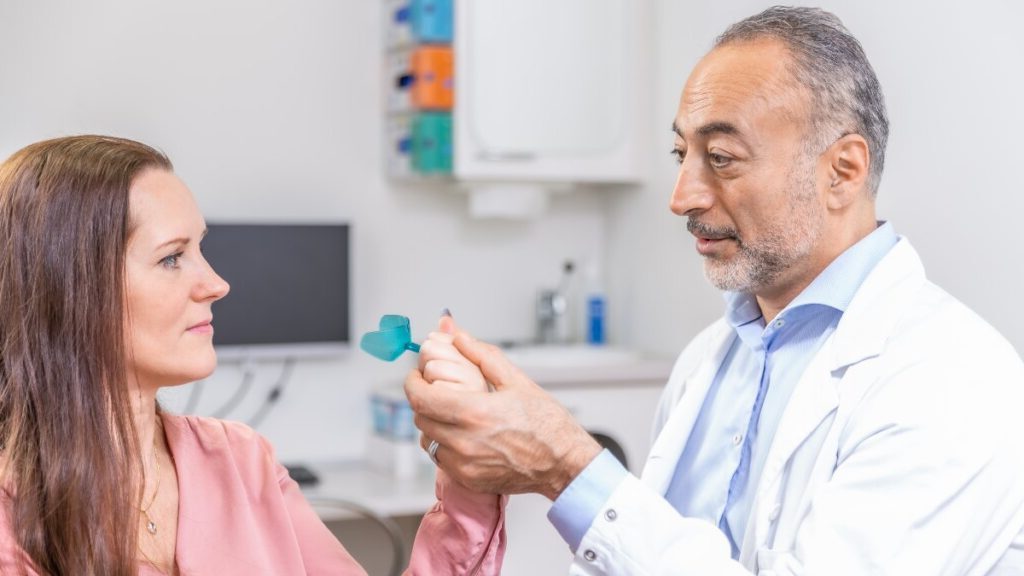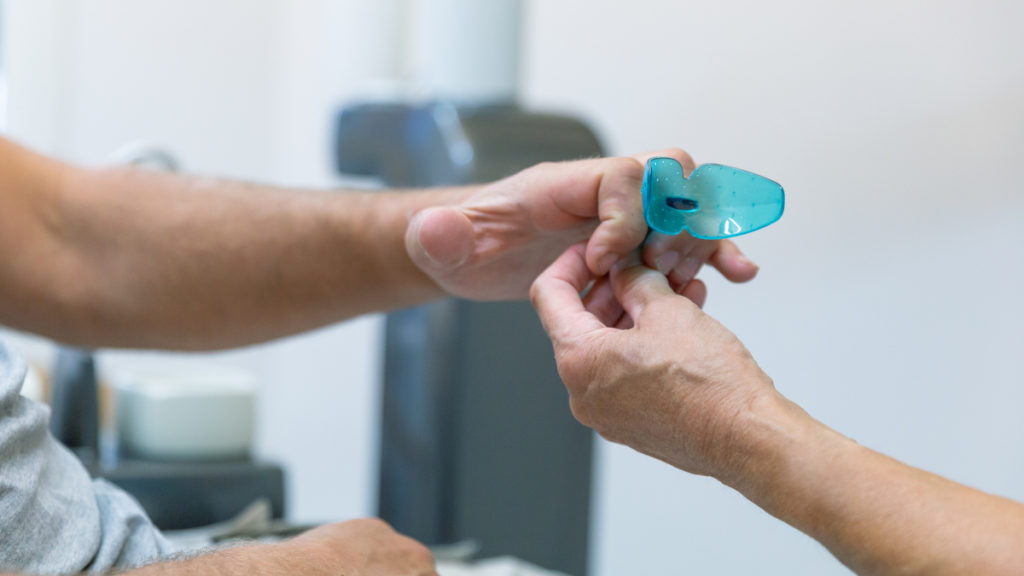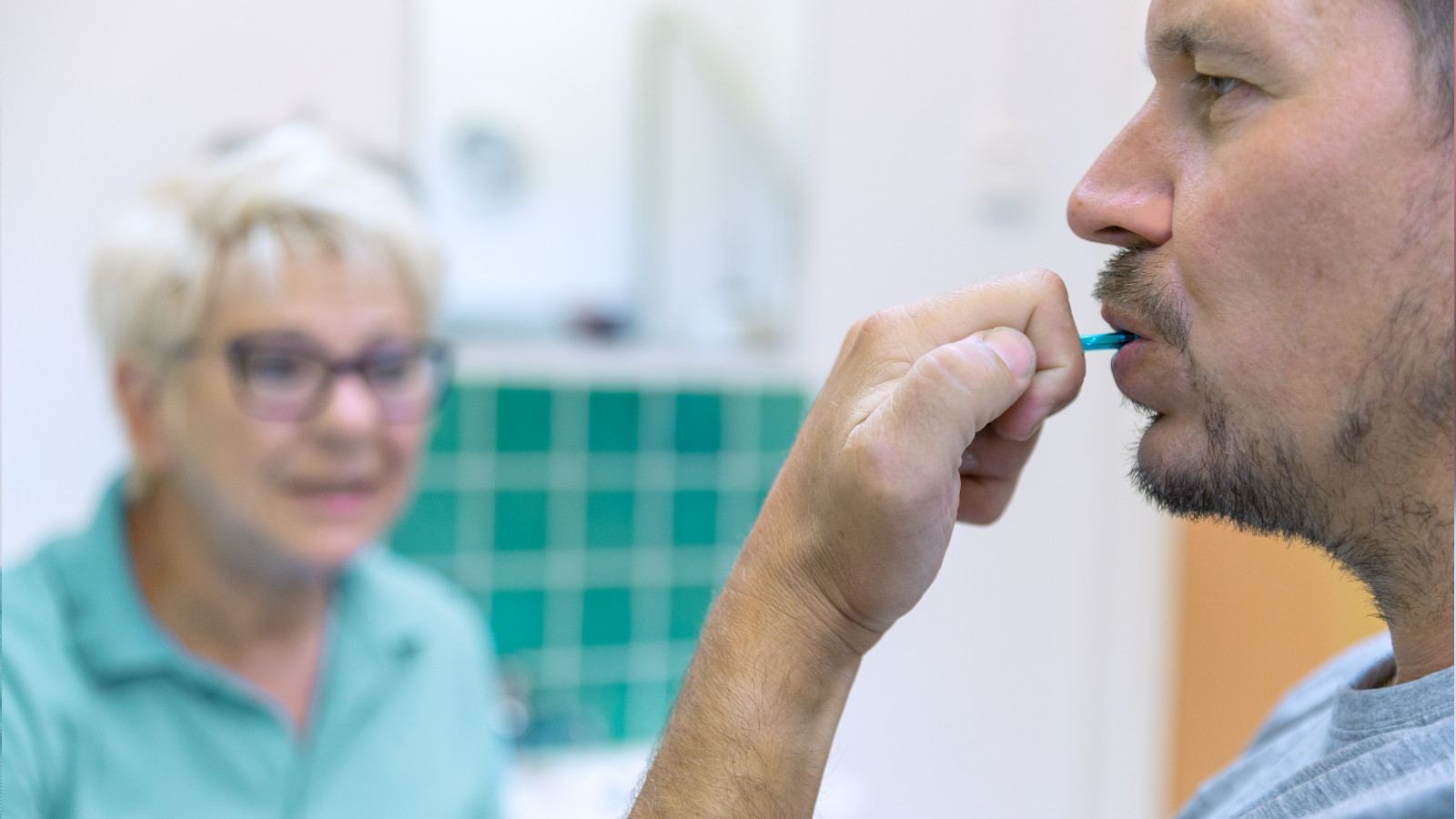Treating acid reflux with IQoro
Treating acid reflux with IQoro can help almost anybody with symptoms of a hiatal hernia. On this page, you’ll find more information on how IQoro can help your patients with acid reflux, and how to introduce IQoro as a treatment to your patient.

How can I use IQoro to treat my patient?
IQoro offers a non-invasive, non-pharmaceutical alternative to treating acid reflux symptoms by addressing the underlying cause of the problem – weakened musculature.
IQoro can be used as an alternative treatment for patients with acid reflux. Some patients might have experienced several years of unsuccessful treatment, and some patients will be unwilling or unable to continue with medication from the PPI class of drugs.
NICE health care pathways
The NICE health care pathways list a graded variety of options for treatment.
The first is concerned with lifestyle changes, then medication and possibly surgical intervention at some stage. The pathways in question cover treating Dyspepsia and GERD in adults, and in children and young people. IQoro was shown as a ‘self management’ option at the time of writing: before prescription status.
Who can IQoro training help?
IQoro can help almost anybody exhibiting symptoms like acid reflux connected to hiatal hernia. Your patient may be reporting the onset of the problem for the first time, or they may be making a repeat visit after several years of unsuccessful treatment.
The most common symptoms of a hiatal hernia are:
- Acid reflux
- Heartburn
- Swallowing difficulties
- Lump or blockage in the chest
- Nausea
- Gassiness
- Persistent cough
- Chest pains or pain under the breastbone
- Stomach pains before or after eating
Other symptom might be the feeling of food or drink ‘going down the wrong way’, reduced appetite or early “full-up” feeling. Hoarseness is also a known symptom.
Equally effective when a hiatal hernia has not been confirmed
Several scientific studies and patient surveys have shown that IQoro is equally effective in treating the above symptoms whether or not a hiatal hernia has been confirmed by examination. The clear conclusion is that it is a hiatal hernia which underlies the symptoms in most cases.
There are many potential benefits in starting IQoro training immediately that the symptoms exhibit, even if an internal examination cannot be scheduled to confirm the condition.
A certain degree of commitment is needed from the patient
Starting training with IQoro is easy for the patient, nevertheless a certain degree of commitment must be present in order for the treatment to succeed.
Before prescribing an IQoro it is advantageous to determine that the patient is committed to treating his or her condition, that they understand that it will require 3 x 30 second training sessions per day, and that the process may take several months.
It has been proven in tens of thousands of cases that patients are willing to do this – partially because of the encouragement they feel from some early signs of improvement.
Many existing users of IQoro have drawn encouragement from joining our Facebook group – Training with IQoro, where novices and satisfied users can exchange their stories and support their peer-group.
How does IQoro treat a hiatal hernia?
IQoro treats hiatal hernia by stimulating normal sensory and motor nerve activity to strengthen and coordinate weakened musculature.
By stimulating the same muscles and nerves that are used when swallowing food or water, but in a more intense way, it is possible to rebuild muscle strength and allow the muscles in the hiatal canal to regain their ability to grip around the oesophagus.
NICE have issued a Medtech Innovation Briefing regarding IQoro treatment for hiatus hernia which states:
“The intended place in therapy would be as an alternative to long-term proton pump inhibitor (PPI) treatment or laparoscopic fundoplication surgery in people with hiatus hernia.”
Striated and smooth muscles
If a patient presented with an arm that had atrophied because it had been in a plaster cast for some weeks, we might expect a rehab programme based on weights and exercises.
However, the atrophied-arm parallel has an important disconnect. There are key differences between the arm muscles and many of the muscles that are needed to prevent LES intrusion through the diaphragm allowing reflux.
The arm is made up of skeletally striated muscles that can be commanded by the individual to flex, and can therefore be consciously exercised; whereas most of the muscles in the swallowing chain cannot.
Also, not all the muscles in the swallowing chain are striated – they also include smooth muscles which are controlled and commanded through the autonomic nervous system. The paradox then, is how to exercise muscles that cannot be commanded to flex.
Would you like a deeper understanding of the complexities of the neurological processes involved? Read more about the neurological processes involved in IQoro. A peer-reviewed and internationally published chapter presents more explanation and evidence of IQoro’s abilities in relation to treating hiatal hernia.
Introducing IQoro to a patient

Introducing IQoro to your patient won’t take long, and most people will be able to get started without any assistance at all.
We have developed a page that will make the introduction even easier. Simply give this information to your patient, and they will get an overview of why IQoro has been recommended and how to get started.
This page was developed at the request of an NHS GP practice to support IQoro deployment to their patients.
Our helpdesk is also available through phone or email to provide information, support and answer patient’s inquiries.
What results might be expected?
The scientific studies relating to treating hiatus hernia with IQoro were based on a 6 months treatment period. Of those that had successful outcomes the results were achieved at some stage during the study, not necessarily at the end-of-treatment.
At the end-of-treatment assessment some patients were not fully recovered but most were. In clinical experience patient results seem to start to be visible at all time points: in rare cases within a week, often within a month and sometimes only after a much longer period.
Effective in reducing the need for medication
NICE issued a Medtech Innovation Briefing regarding IQoro treatment for hiatus hernia which included the quote:
“All patients continued with their PPI medication as advised. As symptoms reduced, patients ceased to medicate. Use or cessation of PPIs was under the control of the patients’ doctors. At end-of-training in the 3 studies quoted 93%, 58% and 61% ceased all PPI medication, the remainder mostly reduced dose and intake frequency”.

PPI reduction and managing reflux rebound
Clinicians have traditionally found that patients can often find it difficult to cease PPI medication, although all are agreed that this is usually a valid aim. A major obstacle has been the Rebound Acid Hyper Secretion (RAHS) that patients often experience.
Debbie Grayson is a pharmacist and expert in the use of PPI medication and has a great deal of experience of successfully weaning patients. This article, published in the Primary Care Society for Gastroenterology (PCSG) magazine ‘Digestif’ discusses the subject and presents successful strategies for managing the process.
Amongst other things she emphasises that merely stopping medication without addressing the underlying muscular weakness first will lead to reflux recurring. Learn from Debbie’s experience here.

User survey
A large-scale survey of IQoro users conducted in 2021 elicited the response that all but half of respondents (N=4,440) saw positive changes that they attributed to IQoro training within two months, and 75% within five.
Similarly, the survey showed that 18% had ceased all PPI medication, and 26% had reduced intake. The equivalent figures for Over The Counter (OTC) medication were 21% and 75%. In all the outcome figures shown in this paragraph, some users had only been using their IQoro for a month and hence will have not usually added to the positive results picture.
IQoro users

IQoro is used by over 100,000 individuals across Europe to self-treat. 77% of these are treating acid reflux conditions.
Independent SLTs in the UK were early adopters, 30+ NHS Trusts deployed IQoro to some extent before prescription status in May 2022. Most healthcare professionals in the UK who have used IQoro so far have used it to treat dysphagia and related conditions.
A Service Evaluation conducted by the Royal Devon and Exeter NHS Trust and supported by the South West Academic Health Science Network (AHSN) specifically evaluated the suitability of IQoro in treating patients in NHS acute, in-patient rehab, and community settings.
This included patients with dysphagia also presenting with the symptoms of acid reflux. Speech therapists in the NHS use IQoro to treat voice disorders caused by acid reflux.
IQoro is a cost-effective treatment
Possible savings are in the areas of reduced medication costs, avoided future visits to primary and secondary care, avoided endoscopies in non-red flag cases (£500) avoided laparoscopic fundoplication procedures (£4,434).
Contraindications to the use of IQoro
IQoro is contraindicated in patients suffering from
- Trigeminal neuralgia
- Paraesophageal hernia
- Achalasia Cardiae
And the treatment should be started carefully for patients with
- Tinnitus
- Whiplash injury
- Peripheral facial palsy
You can read more about this here: